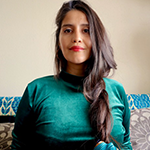Translator’s Note
The following excerpts come from Guerrilla Blooms, the Spanish/Mapudungun-to-English translation of Daniela Catrileo’s 2018 poetry collection, Guerra florida/Rayülechi malon. Born in Santiago, Chile in 1987, Daniela Catrileo is a writer, professor of philosophy, and activist who, in recent years, has become an essential voice in both Chilean letters and Mapuche cultural production. As part of an emerging generation of Mapuche literary and visual artists whose work centers the experience of the Mapuche diaspora, Catrileo’s poetics reflects on the contours and multiplicities of Mapuche identity in the wake of exile, migration, and colonization, both historical and ongoing.
Originally appearing in print as a bilingual Spanish-Mapudungun edition, Guerrilla Blooms reimagines the arrival of the colonizers from the perspective of an indigenous woman who, alongside her partner and a collective of other women warriors (weichafe), takes up arms against them. Comprised of individual poems connected by an overarching narrative, the text is a work of poetic fiction that, in both its form and content, explores the crossings of multiple territories, languages, and indigenous imaginaries and subverts the dominant narrative of colonization told from the perspective of the invaders. In this way, rather than offer a singular or teleological account of colonization, Catrileo’s poems unfold across vertiginous landscapes and chronologies, a gesture that frames colonial violence not as a single, completed event, but rather as the much more expansive imposition of ideologies and imaginaries that continue to shape and alter ways of knowing and being to this day. This articulation of colonization as that which continues to forcefully echo in all aspects of contemporary life emerges from the realities facing Mapuche communities today, who continue to confront neo-colonial violence through rampant extractivism, police brutality, and continued struggles over their land, language, and rights.
The poems in Guerrilla Blooms also toggle between the intimate and the collective, articulating the violence that permeates the text as both colonial and patriarchal. The collection opens, for example, with a bucolic moment shared between the poetic voice and her lover, who is known throughout the collection as only “s h e” or “h e r.” The intimacy shared between the two women is interrupted, however, by the arrival of the unknown invaders, whose war not only deprives the women of their land, but also of their bodily autonomy. Across the text, Catrileo entangles the struggle against colonialism with indigenous feminisms in order to think about the multiple forces of oppression against which the weichafe must fight.
Catrileo’s reflections on colonialism, feminism, diaspora, and state violence are both urgent and timely, not only offering more diverse perspectives on Mapuche culture and its relationship to Chilean society, but also new avenues for thinking about similar conversations that are currently unfolding in the US. In Chile, Guerra florida was honored in the poetry category of the Premios Municipales de Santiago, a prize that Catrileo shares with three of the most celebrated Mapuche poets working today, and her short story collection, Piñen (2019), was honored by Chile’s prestigious Premios Literarios as the Best Literary Work in the short story category. Catrileo has also read on panels at multiple international festivals and events, including a recent appearance alongside Natalie Diaz at the International Literature Festival in Berlin on a panel about Indigenous poetry. Excerpts from Guerrilla Blooms have appeared or are forthcoming in my translation in New England Review, Guernica, Northwest Review, and mercury firs, as well as in the anthology Daughters of Latin America, due out this year from HarperCollins. A previously-untranslated essay by Catrileo is also slated for publication this spring in Words Without Borders as part of a series on Mapuche lyric essays. This would be the first full-length collection of Catrileo’s poetry to appear in English translation, and I can confirm that the English-language rights are available. Should you be interested in learning more about the project, please don’t hesitate to contact me at [email protected].
Edith Adams
Four Trilingual Poems from Guerrilla Blooms
That afternoon I could feel
your breath on my face
We were so close to winning
but we would never be heroines
I wrapped my arms around your waist
to touch my bones to your bones
and say:
this dance
it’s for us
Esa tarde pude sentir
tu respiración en mi rostro
Estábamos tan cerca de ganar
pero nunca fuimos heroínas
Envolví mis brazos en tu cintura
para tocar mis huesos en tus huesos
y decir:
esta danza
es por nosotras
Feychi nagantü
neyüñmaen iñche ñi ange
Epe wewfuyu
welu turpu wewfengelayu
Rofülelfiñ tami trarütuwe
iñche ñi foro ñi fülafiel eymi mi foro
ka iñche ñi feypiael:
tüfachi purun
iñchiw-ngealu
*
So this is what it’s like this is how it feels
This is what it is to be shot
a lashing by iron till you disappear
You have your knuckles tensed
on the string of the bow
your thoughts aimed at returning
to H e r
Suddenly
you hear the crackle of vertebrae
and you draw Lorca’s last breath
on this drowsy charred night
it is you who f a l l s
it is your blood seeding succulents
your eyes extinguishing the sun
in the howl of the jungle
………………………………………….Así que esto era así se siente
………………………………………….Esto es recibir un disparo
………………………………………….un zarpazo de plomo hasta desaparecer
………………………………………….Tienes tus nudillos tensados
………………………………………….en la cuerda del arco
………………………………………….tus pensamientos dirigidos en volver
………………………………………….a E l l a
………………………………………….De pronto
………………………………………….escuchas el crepitar de vertebras
………………………………………….y eres tú en el segundo de Lorca
………………………………………….esta noche adormecida y carbonizada
………………………………………….eres tú la que c a e
………………………………………….es tu sangre sembrando suculentas
son tus ojos apagando el sol
………………………………………….en el aullido de la selva
………………………………………….Felerkey tüfa may felelley tati
………………………………………….Tüfa tati tralkaturumengen tati
………………………………………….tritri chüngarkünuenew ñi ñamürpualu
………………………………………….Nünieymi tami kuwü mew
………………………………………….ti def chüngfülwe
………………………………………….petu rakiduamimi mi wiñotuael
feychi D o m o mew
………………………………………….Müchay müten
………………………………………….allkütuymi troy wingküll ñi rararün
………………………………………….eymi may Lorca ñall lamngümngeael
………………………………………….eymi ta tüfachi umawtulechi pun kuyulkülewen
………………………………………….eymi feychi t r a n a n a g m e k e l u
………………………………………….fey tami mollfüñ tukukamekelu suculenta lawen
………………………………………….fey tami nge chongümmekelu ti antü
waglün mawidantu mew
*
I saw the bastard’s eyes
trembling beneath my bow
I took his head and yanked his hair
What the hell have you done!
-I screamed-
I screamed so loud
that I saw his pores unfurl
toward the sun
His entire body
retreated from my sounds
He was only a boy
I had never seen skin so white
He had a cross clinging to his neck
that I broke apart with my teeth
He never learned to respond to my screams
He babbled something
not merely animal
I fell crumbling
before the trickle of his blood
I drank from his canteen
till somebody screamed:
Cut!
and a wooden slate snapped
its clapper
it was that or waking up
Vi los ojos del maldito
temblando bajo mi arco
Le tomé la cabeza y agarré sus cabellos
¡Qué mierda han hecho!
-le grité-
Le grité tan fuerte
que vi sus poros abrirse
ante el sol
Su cuerpo entero
se recogía a mis sonidos
Era tan sólo un muchacho
nunca había visto una piel tan blanca
Tenía una cruz aferrada al cuello
que rompí con mis dientes
Nunca supo responder a mis gritos
balbuceaba algo
que no era de animal
Caí derrumbada
ante el goteo de su sangre
bebí de su cantimplora
hasta que alguien gritó:
¡Corte!
y una tabla de madera cerró
sus clavijas
fue eso o despertar
Pefiñ ti wedañma ñi nge
trüntrünkülen miñche chüngfülwe
Nütufiñ ñi longko, ñi kal ka
“¡Chumimi ama!”
-wirarfiñ engün-
Fente ñi wirarfiel
fey pefiñ ñi trawa ñi nülakünuwel engün
pañü mew
Kom ñi kalül
tüngküluwi iñche ñi allkütuetew mew
Kiñe pichi wentru müten tati
turpu pekelafiñ feychi müna ligkülechi trawa
Nüniefui kiñe kürus pel mew
watrokünuel iñche ñi foro mew
Turpu allküñmakelaenew ñi wirar
küfüllngey ñi dungun
kulliñdungun no
Ütrüfnagün iñche
fey ñi mollfüñ ñi lüykü-lüyküngen
pütokokünufiñ fey ñi ko
fey wüla kiñe che newentu feypi:
¡Llochi!
fey kiñe trafla trapümtuy
ñi troy
feyfel chi kam trepeafel chi
*
I lick my shadow in the taxi
before returning home
We leave the bar
that everyone knows
but no one names
where they prepare
the best lines
of the night
We leave in a hurry
spiral staircase
when the pigs arrive
asking for our identities
And now I remember it
as though it were my last night
without an identity
Now that I am the sacrifice
the indigenous plague of the colonizer
I open myself like La Malinche
undomesticated bitch
Voy lamiendo mi sombra en el taxi
antes de volver a casa
Salimos del bar
que todos conocen
pero nadie nombra
donde preparan
las mejores líneas
de la noche
Salimos corriendo
escalera caracol
cuando llegan los ratis
a pedir nuestra identidad
Y ahora la recuerdo
como si fuese mi última noche
sin identidad
Ahora que soy el sacrificio
la peste indígena de los colonos
me abro como la Malinche
perra sin domesticar
Küllmatuwkülen kidu ñi aywiñ taxi mew
petu ñi wiñotunon ruka mew
Tripatuyu putuwe mew
kom che ñi kimnieel
welu iney rume ñi üytunieel
chew ñi pepikangemum
ti doy kümeke wirin
mülelu pun mew
Lefkülen tripayu
ngüñukülechi pürapürawe mew
akurumelu ti pu rati
yu ramtupayaetew yu ineyngen ta iñchiw
Fewla tukulpafiñ fachi pun
iñche ñi afpun pun reke
petu kimnienolu iñche ñi ineyngen
Fewla wüluwülu am ta iñche
pu kolono ñi mapun pesten
wirakünuwün Malinche reke
awkan domo trewa tati
Translations into English by Edith Adams
Translations into Mapudungun by Arturo Ahumada
Main image: Cover art from the Spanish/Mapudungun edition of Guerra florida/Rayülechi malon, published by Editorial del Aire in 2018.





